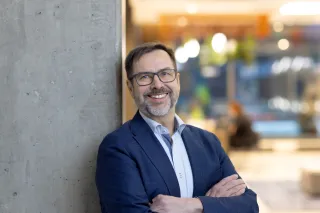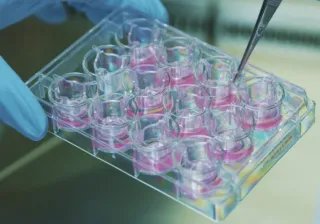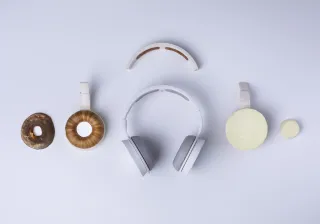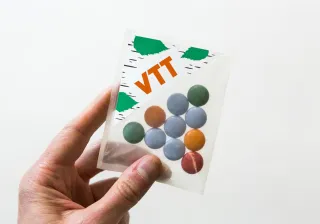The suitability of safe and environmentally friendly antimicrobial solutions that can replace plastic is being tested in a hospital environment at Central Finland Central Hospital in Jyväskylä. A joint project involving VTT, JAMK University of Applied Sciences, Central Finland Health Care District and companies in the sector has identified wood-based compounds that are effective in reducing microbes. These compounds are currently being tested in a hospital environment. The participants have also selected the wood-based materials that show the most promise in terms of replacing plastic products made from fossil raw materials in hospitals.
The Sami&Samu project, which has progressed to the test stage, has surveyed a large number of promising wood-based substances for reducing microbes and identified solutions that can replace fossil-based plastics. This would decrease the use of non-renewable natural resources and increase material recycling.
Bio-based materials to replace fossil-based plastics
The most interesting targets for bio-based materials in the hospital environment include hospital textiles, packaging materials as well as disposable and take-out containers used by restaurants and cafés.
Replacing traditional fossil-based plastics with bio-based materials saves non-renewable natural resources. With consideration to the legislation concerning hospital applications, several materials have been selected as research targets and are being tested at medicine wards selected by the Central Finland Health Care District.
The most promising solutions in the Sami&Samu project have been tested at Central Finland Central Hospital during the latter part of 2020.
Examples of the solutions and applications include:
-
The hospital's internal and pulmonary medicine ward tested hospital privacy curtains treated with bio-based antimicrobial coatings developed by VTT.
-
A batch of durable fabric patient bags manufactured by Paptic Ltd with a new type of wood-based material were distributed to project stakeholders for trial use.
-
The hospital tested wood-based coffee cups and salad plates produced by Walki Oy as a replacement for traditional disposable containers containing plastic.
-
The aim of a dirt-repellent and easy-to-clean coating produced by Millidyne Oy were used to improve the hygiene level of the hospital's floor and table surfaces.
-
The functionality and durability of Millidyne Oy’s dirt-repellent and easy-to-clean coating were tested on floor and table surfaces in the hospital.
Active substances from the forest
Finnish forests offer plenty of possibilities with regard to sources of antimicrobial and other bioactive compounds. These compounds are found in all parts of trees and, for example, are particularly plentiful in tree bark and needles. Bark piles at sawmills and pulp mills as well as forest residues contain large amounts of promising substances and compounds. Products containing wood-based chemicals have been on the market for a long time: some examples include resin salves, detergents and cleaners.
Hospital privacy curtains need to have antimicrobial properties, which means the ability to destroy microbes and prevent their growth. This is currently achieved by adding synthetic chemicals or metal particles during the curtain production stage. Studies performed in the Sami&Samu project showed that resin and tannins of the bark are promising antimicrobial compounds. As a result, the project examined the possibilities to use tannins to enhance or replace existing substances. Tests conducted at Central Finland Central Hospital over a monitoring period of two months will determine whether the microbe levels in curtain fabrics coated with tannin differ in comparison to conventional privacy curtains. The tannins that have been tested are commercial products.
Components isolated from wood can also be used in universal detergents. Previous studies have provided useful information how different pretreatments and quality of raw-materials impact on composition, yield and antimicrobial effectiveness of promising components. Components isolated in different ways have been tested in wood coatings and chemical industry applications. Antimicrobial components were isolated from fresh coniferous and birch trees at JAMK University of Applied Sciences.
A camera system to evaluate cleaning results and microbe amounts
Another aim of the Sami&Samu project is to find a new, effective and quick way of measuring the results of cleaning work. A number of effective and reasonably priced commercial camera systems were selected for the tests. The project will also examine the potential of new technologies, such as hyperspectral imaging, to determine the level of cleanliness and identify bacteria.
Sami&Samu project
The two-year Sami&Samu project launched in August 2018 has a total budget of EUR 657,000. The project is being implemented by VTT, JAMK University of Applied Sciences and the Central Finland Health Care District in cooperation with industrial operators in the sector. The project is coordinated by VTT. The Regional Council of Central Finland is the main funder in the project, with the research partners and participating companies providing the rest of the funding. The project results will be available in spring 2021 and the project will end in June 2021.
The following companies are participating in the project: KiiltoClean Oy, Millidyne Oy, Paptic Ltd, Sakupe Oy, Serres Oy, UPM-Kymmene Oyj, Walki Oy, Woodly Oy and Repolar Pharmaceuticals Oy.
Photo: Hospital privacy curtains treated with bio-based, antimicrobial coatings are being tested at Hospital Nova. (Photo source: Juho Jäppinen)
Further information
VTT Technical Research Centre of Finland Ltd
Matti Virkkunen, Senior Scientist
Tel. +358 40 545 1743 [email protected]
JAMK University of Applied Sciences
Jaana Mäkelä, Specialist
Tel. +358 400 917 386, [email protected]
Central Finland Health Care District
Chief Development Physician Pirjo Mustonen
Tel. +358 14 269 5290, [email protected]








